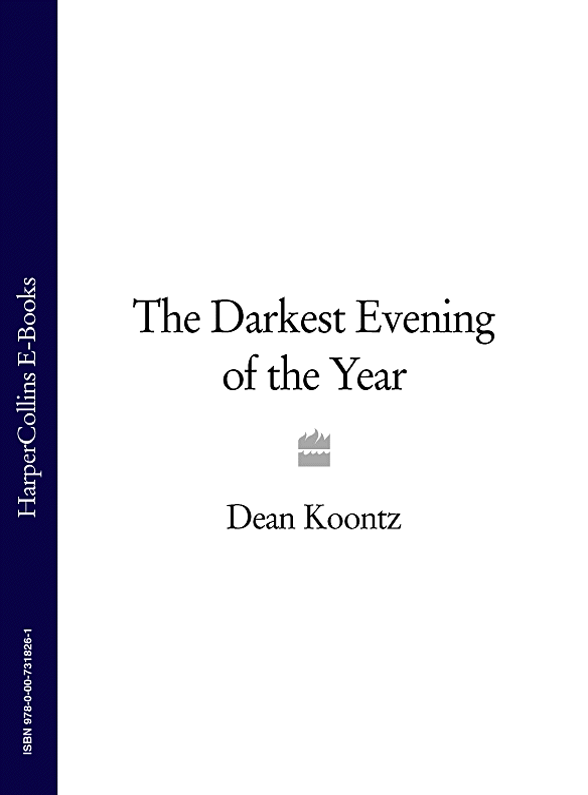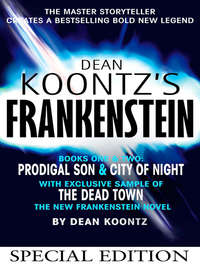
Полная версия
The Darkest Evening of the Year


DEAN KOONTZ
The Darkest Evening of the Year

Dedication
To Gerda, who will one day be greeted jubilantly in the next life by the golden daughter whom she loved so well and with such selfless tenderness in this world.
AND TO
Father Jerome Molokie, for his many kindnesses, for his good cheer, for his friendship, and for his inspiring devotion to what is first, true, and infinite.
Contents
Cover Title Page Dedication Part One Chapter One Chapter Two Chapter Three Chapter Four Chapter Five Chapter Six Chapter Seven Chapter Eight Chapter Nine Chapter Ten Chapter Eleven Chapter Twelve Chapter Thirteen Chapter Fourteen Chapter Fifteen Chapter Sixteen Chapter Seventeen Chapter Eighteen Chapter Nineteen Chapter Twenty Chapter Twenty One Chapter Twenty Two Chapter Twenty Three Chapter Twenty Four Chapter Twenty Five Chapter Twenty Six Chapter Twenty Seven Chapter Twenty Eight Chapter Twenty Nine Chapter Thirty Chapter Thirty One Chapter Thirty Two Part Two Chapter Thirty Three Chapter Thirty Four Chapter Thirty Five Chapter Thirty Six Chapter Thirty Seven Chapter Thirty Eight Chapter Thirty Nine Chapter Forty Chapter Forty One Chapter Forty Two Chapter Forty Three Chapter Forty Four Chapter Forty Five Chapter Forty Six Chapter Forty Seven Chapter Forty Eight Chapter Forty Nine Chapter Fifty Part Three Chapter Fifty One Chapter Fifty Two Chapter Fifty Three Chapter Fifty Four Chapter Fifty Five Chapter Fifty Six Chapter Fifty Seven Chapter Fifty Eight Chapter Fifty Nine Chapter Sixty Chapter Sixty One Chapter Sixty Two Chapter Sixty Three Chapter Sixty Four Chapter Sixty Five Chapter Sixty Six About the Author Also by Dean Koontz Copyright About the Publisher
PART ONE
“The woods are lovely, dark, and deep”
—ROBERT FROST
Stopping by Woods on a Snowy Evening
Chapter 1
Behind the wheel of the Ford Expedition, Amy Redwing drove as if she were immortal and therefore safe at any speed.
In the fitful breeze, a funnel of golden sycamore leaves spun along the post-midnight street. She blasted through them, crisp autumn scratching across the windshield.
For some, the past is a chain, each day a link, raveling backward to one ringbolt or another, in one dark place or another, and tomorrow is a slave to yesterday.
Amy Redwing did not know her origins. Abandoned at the age of two, she had no memory of her mother and father.
She had been left in a church, her name pinned to her shirt. A nun had found her sleeping on a pew.
Most likely, her surname had been invented to mislead. The police had failed to trace it to anyone.
Redwing suggested a Native American heritage. Raven hair and dark eyes argued Cherokee, but her ancestors might as likely have come from Armenia or Sicily, or Spain.
Amy’s history remained incomplete, but the lack of roots did not set her free. She was chained to some ringbolt set in the stone of a distant year.
Although she presented herself as such a blithe spirit that she appeared to be capable of flight, she was in fact as earthbound as anyone.
Belted to the passenger seat, feet pressed against a phantom brake pedal, Brian McCarthy wanted to urge Amy to slow down. He said nothing, however, because he was afraid that she would look away from the street to reply to his call for caution.
Besides, when she was launched upon a mission like this, any plea for prudence might perversely incite her to stand harder on the accelerator.
“I love October,” she said, looking away from the street. “Don’t
you love October?”
“This is still September.”
“I can love October in September. September doesn’t care.”
“Watch where you’re going.”
“I love San Francisco, but it’s hundreds of miles away.”
“The way you’re driving, we’ll be there in ten minutes.”
“I’m a superb driver. No accidents, no traffic citations.”
He said, “My entire life keeps flashing before my eyes.”
“You should make an appointment with an ophthalmologist.”
“Amy, please, don’t keep looking at me.”
“You look fine, sweetie. Bed hair becomes you.”
“I mean, watch the road.”
“This guy named Marco—he’s blind but he drives a car.”
“Marco who?”
“Marco something-something. He’s in the Philippines. I read about him in a magazine.”
“Nobody blind can drive a car.”
“I suppose you don’t believe we actually sent men to the moon.”
“I don’t believe they drove there.”
“Marco’s dog sits in the passenger seat. Marco senses from the dog when to turn right or left, when to hit the brakes.”
Some people thought Amy was a charming airhead. Initially, Brian had thought so, too.
Then he had realized he was wrong. He would never have fallen in love with an airhead.
He said, “You aren’t seriously telling me that Seeing Eye dogs can drive.”
“The dog doesn’t drive, silly. He just guides Marco.”
“What bizarro magazine were you reading?”
“National Geographic. It was such an uplifting story about the human-dog bond, the empowerment of the disabled.”
“I’ll bet my left foot it wasn’t National Geographic.”
“I’m opposed to gambling,” she said.
“But not to blind men driving.”
“Well, they need to be responsible blind men.”
“No place in the world,” he insisted, “allows the blind to drive.”
“Not anymore,” she agreed.
Brian did not want to ask, could not prevent himself from asking: “Marco isn’t allowed to drive anymore?”
“He kept banging into things.”
“Imagine that.”
“But you can’t blame Antoine.”
“Antoine who?”
“Antoine the dog. I’m sure he did his best. Dogs always do. Marco just second-guessed him once too often.”
“Watch where you’re going. Left curve ahead.”
Smiling at him, she said, “You’re my own Antoine. You’ll never let me bang into things.”
In the salt-pale moonlight, an older middle-class neighborhood of one-story ranch houses seemed to effloresce out of the darkness.
No streetlamps brightened the night, but the moon silvered the leaves and the creamy trunks of eucalyptuses. Here and there, stucco walls had a faint ectoplasmic glow, as if this were a ghost town of phantom buildings inhabited by spirits.
In the second block, lights brightened windows at one house.
Amy braked to a full stop in the street, and the headlights flared off the reflective numbers on the curbside mailbox.
She shifted the Expedition into reverse. Backing into the driveway, she said, “In an iffy situation, you want to be aimed out for the fastest exit.”
As she killed the headlights and the engine, Brian said, “Iffy? Iffy like how?”
Getting out of the SUV, she said, “With a crazy drunk guy, you just never know.”
Joining her at the back of the vehicle, where she put up the tailgate, Brian glanced at the house and said, “So there’s a crazy guy in there, and he’s drunk?”
“On the phone, this Janet Brockman said her husband, Carl, he’s crazy drunk, which probably means he’s crazy from drinking.”
Amy started toward the house, and Brian gripped her shoulder, halting her. “What if he’s crazy when he’s sober, and now it’s worse because he’s drunk?”
“I’m not a psychiatrist, sweetie.”
“Maybe this is police business.”
“Police don’t have time for crazy drunk guys like this.”
“I’d think crazy drunk guys are right down their alley.”
Shrugging off his hand, heading toward the house once more, she said, “We can’t waste time. He’s violent.”
Brian hurried after her. “He’s crazy, drunk, and violent?”
“He probably won’t be violent with me.”
Climbing steps to a porch, Brian said, “What about me?”
“I think he’s only violent with their dog. But if this Carl does want to take a whack at me, that’s okay, ’cause I have you.”
“Me? I’m an architect.”
“Not tonight, sweetie. Tonight, you’re muscle.”
Brian had accompanied her on other missions like this, but never previously after midnight to the home of a crazy violent drunk.
“What if I have a testosterone deficiency?”
“Do you have a testosterone deficiency?”
“I cried reading that book last week.”
“That book makes everyone cry. It just proves you’re human.”
As Amy reached for the bell push, the door opened. A young woman with a bruised mouth and a bleeding lip appeared at the threshold.
“Ms. Redwing?” she asked.
“You must be Janet.”
“I wish I wasn’t. I wish I was you or anybody, somebody.” Stepping back from the door, she invited them inside. “Don’t let Carl cripple her.”
“He won’t,” Amy assured the woman.
Janet blotted her lips with a bloody cloth. “He crippled Mazie.”
Mouth plugged with a thumb, a pale girl of about four clung to a twisted fistful of the tail of Janet’s blouse, as if anticipating a sudden cyclone that would try to spin her away from her mother.
The living room was gray. A blue sofa, blue armchairs, stood on a gold carpet, but a pair of lamps shed light as lusterless as ashes, and the colors were muted as though settled smoke from a long- quenched fire had laid a patina on them.
If Purgatory had formal parlors for the waiting multitudes, they might be as ordered and cheerless as this room.
“Crippled Mazie,” Janet repeated. “Four months later, he …” She glanced down at her daughter. “Four months later, Mazie died.”
Having begun to close the front door, Brian hesitated. He left it half open to the mild September night.
“Where is your dog?” Amy asked.
“In the kitchen.” Janet put a hand to her swollen lip and spoke between her fingers. “With him.”
The child was too old to be sucking her thumb with such devotion, but this habit of the crib disturbed Brian less than did the character of her stare. A purple shade of blue, her eyes were wide with expectation and appeared to be bruised by experience.
The air thickened, as it does under thunderheads and a pending deluge.
“Which way to the kitchen?” Amy asked.
Janet led them through an archway into a hall flanked by dark rooms like flooded grottoes. Her daughter glided at her side, as firmly attached as a remora to a larger fish.
The hall was shadowy except at the far end, where a thin wedge of light stabbed in from a room beyond.
The shadows seemed to ebb and flow and ebb again, but this phantom movement was only Brian’s strong pulse, his vision throbbing in time with his laboring heart.
At the midpoint of the hallway, a boy leaned with his forehead against a wall, his hands fisted at his temples. He was perhaps six years old.
From him came the thinnest sound of misery, like air escaping, molecule by molecule, from the pinched neck of a balloon.
Janet said, “It’ll be okay, Jimmy,” but when she put a hand on the boy’s shoulder, he wrenched away from her.
Trailed by her daughter, she proceeded to the end of the hall and pushed the door open, and the stiletto of light became a broad-sword.
Entering the kitchen behind the two women and the girl, Brian could almost have believed that the source of the light was the golden retriever sitting alertly in the corner between the cooktop and the refrigerator. The dog seemed to shine.
She was neither pure blond nor the coppery hue of some retrievers, but clothed in many shades of gold, and radiant. Her undercoat was thick, her chest deep, her head beautifully formed.
More compelling than the dog’s appearance were her posture and attitude. She sat erect, head lifted, alertness signified by a slight raising of her pendant ears and by the ceaseless subtle flare-and-quiver of her nostrils.
She didn’t turn her head, but she shifted her eyes toward Amy and Brian—and at once refocused on Carl.
The man of the house was at the moment something less than a man. Or perhaps he was only what any man eventually might become when guided by no hand but his own.
When sober, he probably had a neighborly face or at least one of those faces that, seen by the thousands in city streets, is a bland mask of benign indifference, with lips compressed and eyes fixed on a distant nothing.
Now, as he stood beside the kitchen table, his face was full of character, though of the wrong kind. His eyes were watery with drink and blood, and he looked out from under a lowered brow, like a bull that sees on every side the challenge of a red cape. His jaw hung slack. His lips were cracked, perhaps from the chronic dehydration that afflicts an alcoholic.
Carl Brockman turned his gaze on Brian. In those eyes shone not the mindless aggression of a man made stupid by drink, but instead the malevolent glee of a chained brute who had been liberated by it.
To his wife, in a voice thick with bitterness, he said, “What’ve you done?”
“Nothing, Carl. I just called them about the dog.”
His face was a snarl of knotted threats. “You must want some.”
Janet shook her head.
“You must really want some, Jan. You do this, you know it’s gonna get you only one thing.”
As though embarrassed by the evidence of her submissiveness, Janet covered her bleeding mouth with one hand.
Crouching, Amy called to the dog. “Here, cutie. Come here, girl.”
On the table stood a bottle of tequila, a glass, a salt shaker in the shape of a white Scottish terrier, and a plate holding slices of a fresh lime.
Raising his right hand from his side and high above his head, Carl revealed a tire iron. He gripped it by the pry end.
When he slammed the tool down hard upon the table, slices of lime leaped from the plate. The bottle of tequila wobbled, and the ice rattled in the glass.
Janet cringed, the little girl stoppled a cry with her thumb, Brian winced and tensed, but Amy just continued to coax the retriever to come to her. The dog was neither startled nor made fearful by the crash of iron on wood.
With a backhand swing of the tool, Carl swept everything off the table. At the farther end of the kitchen, tequila splashed, glass shattered, and the ceramic Scottie scattered salt across the floor.
“Get out,” Carl demanded. “Get out of my house.”
Amy said, “The dog’s a problem. You don’t need a problem dog. We’ll take her off your hands.”
“Who the hell are you, anyway? She’s my dog. She’s not yours. I know how to handle the bitch.”
The table was not between them and Carl. If he lurched forward and swung the tire iron, they might be able to dodge a blow only if the tequila made him slow and clumsy.
The guy didn’t look slow and clumsy. He seemed to be a bullet in the barrel, and any wrong move they made or wrong word they spoke might be the firing pin that sent him hurtling toward them.
Turning his malevolent gaze upon his wife, Carl repeated, “I know how to handle the bitch.”
“All I did,” Janet said meekly, “was give the poor thing a bath.”
“She didn’t need a bath.”
Pleading her case but careful not to argue it, Janet said, “Carl, honey, she was filthy, her coat was all matted.”
“She’s a dog, you stupid skank. She belongs in the yard.”
“I know. You’re right. You don’t want her in the house. But I was just, I was afraid, you know, afraid she’d get those sores like she did before.”
Her conciliatory tone inflamed his anger instead of quenching it. “Nickie’s my dog. I bought her. I own her. She’s mine.” He pointed the tire iron at his wife. “I know what’s mine, and I keep what’s mine. Nobody tells me what to do with anything that’s mine.”
At the start of Carl’s rant, Amy rose from a crouch and stood staring at him, rigid and still and moon-eyed.
Brian saw something strange in her face, an expression he could not name. She was transfixed but not by fear.
Pointing the tire iron at Amy now, instead of at his wife, Carl said, “What are you staring at? What’re you even doing here, you dumb bitch? I told you Get out.”
Brian put both hands on a dinette chair. It wasn’t much of a weapon, but with it, he might be able to block the tire iron.
“Sir, I’ll pay you for the dog,” Amy said.
“You deaf?”
“I’ll buy her.”
“Not for sale.”
“A thousand dollars.”
“She’s mine.”
“Fifteen hundred.”
Familiar with Amy’s finances, Brian said, “Amy?”
Carl transferred the tire iron from his right hand to his left. He flexed his free hand as if he had been gripping the tool with such ferocity that his fingers had cramped.
To Brian, he said, “Who the hell are you?”
“I’m her architect.”
“Fifteen hundred,” Amy repeated.
Although the kitchen was not too warm, Carl’s face glistened with a thin film of greasy perspiration. His undershirt was damp. This was a drunkard’s sweat, the body struggling to purge toxins.
“I don’t need your money.”
“Yes, sir, I know. But you don’t need the dog, either. She’s not the only dog in the world. Seventeen hundred.”
“What’re you—crazy?”
“Yeah. I am. But it’s a good crazy. Like, I’m not a suicide bomber or anything.”
“Suicide bomber?”
“I don’t have bodies buried in my backyard. Well, only one, but it’s a canary in a shoe box.”
“Somethin’s wrong with you,” Carl said thickly.
“His name was Leroy. I didn’t want a canary, especially not one named Leroy. A friend died, Leroy had nowhere to go, he had nothing but his shabby little cage, so I took him in, and he lived with me, and then I buried him, though I didn’t bury him until he was dead because, like I said, I’m not that kind of crazy.”
Under his brow, Carl’s eyes were deep wells with foul water glistening darkly at the bottom. “Don’t mock me.”
“I wouldn’t, sir. I can’t. I was pretty much raised by nuns. I don’t mock, don’t take God’s name in vain, don’t wear patent-leather shoes with a skirt, and I have such an enlarged guilt gland that it weighs as much as my brain. Eighteen hundred.”
As Carl transferred the tire iron from his left hand to his right, he turned it end for end, now gripping it by the lug socket. He pointed the pry end, the sharp end, at Amy, but said nothing.
Brian didn’t know if the wife-beater’s silence was a good sign or a bad one. More than once, he’d seen Amy talk an angry dog out of a snarl, into a belly rub; but he would have bet his last dollar that Carl wasn’t going to lie on his back and put all four in the air.
“Two thousand,” Amy said. “That’s as much as I have. I can’t go any higher.”
Carl took a step toward her.
“Back off,” Brian warned, raising the dinette chair as if he were a lion tamer, although a lion tamer would also have had a whip.
To Brian, Amy said, “Take it easy, Frank Lloyd Wright. This gentle man and me, we’re building some trust here.”
Carl extended his right arm, resting the tip of the pry bar in the recess between her collarbones, the blade against her throat.
As though unaware that the point of a deadly weapon was poised to puncture her esophagus, Amy said, “So—two thousand. You’re a tough negotiator, sir. I won’t be eating filet mignon for a while. That’s okay. I’m more a hamburger kind of girl, anyway.”
The wife-beater was a chimera now, only part angry bull, part coiled serpent. His gaze was sharp with sinister calculation, and although his tongue was not forked, it slipped between his lips to test the air.
Amy said, “I knew this guy, he almost choked to death on a chunk of steak. The Heimlich maneuver wouldn’t dislodge it, so a doctor cut his throat open there in the restaurant, fished the blockage out.”
As still as stone, the dog remained alert, and Brian wondered if he should take his lead from her. If the bottled violence in Carl was about to be uncorked, surely Nickie would sense it first.
“This woman at a nearby table,” Amy continued, “she was so horrified, she passed out facedown in her lobster bisque. I don’t think you can drown in a bowl of lobster bisque, it might even be good for the complexion, but I lifted her head out of it anyway.”
Carl licked his cracked lips. “You must think I’m stupid.”
“You might be ignorant,” Amy said. “I don’t know you well enough to say. But I’m totally sure you’re not stupid.”
Brian realized he was grinding his teeth.
“You give me a check for two thousand,” Carl said, “you’ll stop payment on it ten minutes after you’re out the door with the dog.”
“I don’t intend to give you a check.” From an inside jacket pocket, she withdrew a wad of folded hundred-dollar bills held together by a blue-and-yellow butterfly barrette. “I’ll pay cash.”
Brian was no longer grinding his teeth. His mouth had fallen open.
Lowering the tire iron to his side, Carl said, “Something’s for sure wrong with you.”
She pocketed the barrette, fanned the hundred-dollar bills, and said, “Deal?”
He put the weapon on the table, took the money, and counted it with the deliberateness of a man whose memory of math has been bleached pale by tequila.
Relieved, Brian put down the dinette chair.
Moving to the dog, Amy fished a red collar and a rolled-up leash from another pocket. She clipped the leash to the collar and put the collar on the dog. “Nice doing business with you, sir.”
While Carl was conducting a second count of the two thousand, Amy tugged gently on the leash. The dog rose at once and padded out of the kitchen, at her side.
With her little girl in tow, Janet followed Amy and Nickie into the hallway, and Brian went after them, glancing back because he half expected Carl to find his rage again and pick up the tire iron.
Jimmy, the keening boy, was silent now. He had moved from the hallway to the living room, where he stood at a window in the posture of a prisoner at his cell bars.
Leading the dog, Amy went to the boy. She stooped beside him, spoke to him.
Brian couldn’t hear what she said.
The front door was open, as he had left it. With the dog prancing smartly at her side, Amy soon joined him on the porch.
Standing on the threshold, Janet said, “You were… amazing. Thank you. I didn’t want the kids to see… see it happen again.”
Her face was sallow in the yellow light of the porch lamp, and the whites of her eyes had a jaundiced tint. She looked older than her years, and tired.
“You know, he’ll get another dog,” Amy said.
“Maybe I can prevent that.”
“Maybe?”
“I can try.”
“Did you really mean what you said when you first answered the door?”
Janet looked away from Amy to study the threshold at her feet, and shrugged.
Amy reminded her: “You wished that you were me. ‘Or anybody, somebody.’”
Janet shook her head. Her voice lowered almost to a murmur. “What you did in there, the money was the least of it. The way you were with him—I can never do that.”
“Then do what you can.” She leaned close to Janet and said something that Brian could not hear.
Listening intently, Janet covered her split and swollen lip with her right hand.







